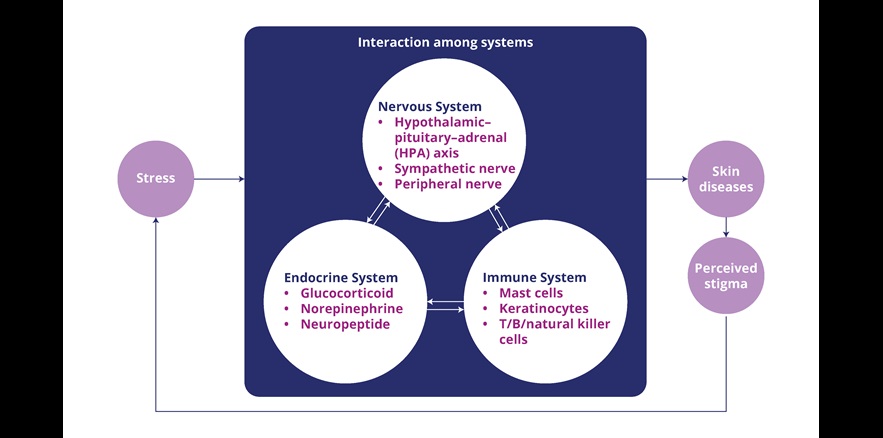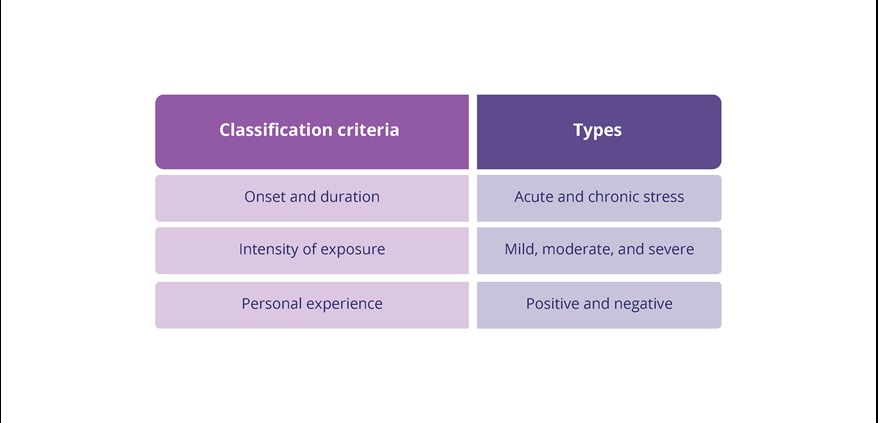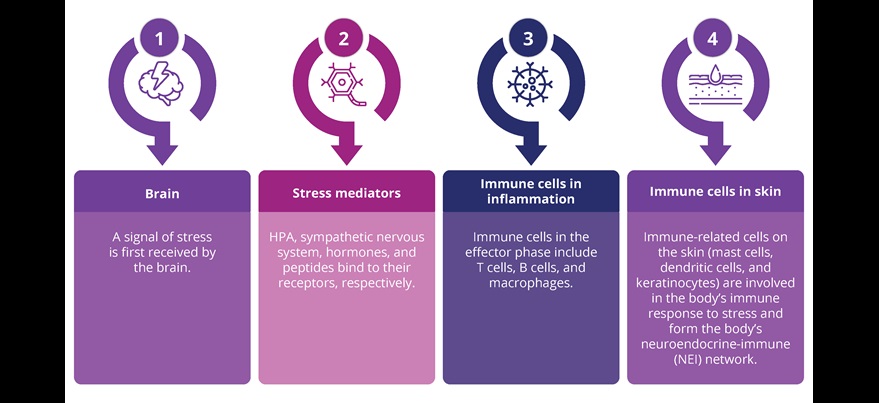DermatoConnect
Does stress have a role in worsening skin diseases?1
Stress and skin diseases can be negatively associated with each other, as the stigma due to skin diseases could worsen the psychological burden, forming a harmful cycle of psychological stress attributed to skin diseases.1
Figure 1: Harmful cycle between psychological stress and skin disease.

Adapted from: Zhang H, et al, Brain Behav Immun. 2024
Stress mechanism
Stress can be classified as follows:1
Table 1: Classification of stress

The circuit of body response to stress is explained below:1

Data reveals psychological stress could augment the release of cortisol, thereby disrupting the skin barrier function, damaging keratinocyte differentiation, raising the risk of skin infections, and significantly worsening atopic dermatitis (AD) and chronic urticaria (CU).1
Stress and AD
Keratinocytes release proinflammatory cytokines that amplify skin inflammation in AD. Cortisol suppresses neutrophil responses that compromise antimicrobial defence against secondary infections in AD lesions.1
Stress and CU
CU could arise due to interactions between the immune and nervous systems. Stress induces the release of substance P and calcitonin gene-related peptide causing pruritis. Proinflammatory cytokines trigger the association of psychological factors and mood changes with urticaria.1
Stress and psoriasis
Psychological stress can induce the onset and exacerbation of psoriasis since stress can alter the NEI network, leading to increased levels of catecholamines, glucocorticoids (GCs), and opioids.1
Stress and skin tumours
Under stress, the HPA axis and nerve system are triggered and release epinephrine, which results in a tumour response.1
Stress and hair disorders
Stress is involved in the process of grey hair and hair loss via the HPA axis and the sympathetic nervous system. Activation of sympathetic nerves, mediating melanocyte stem cell proliferation, and oxidative damage to melanocytes cause grey hair. Regulation of metabolic pathways and mitochondrial functions impact hair colour.
Chronic stress causes increased corticosterone levels, affects the expression of growth-arrest specific 6 protein in dermal mastoid cells, and inhibits hair follicle stem cell activity.1

- The impact of stress on the immune system, involving the HPA axis, sympathetic nervous system, and neuropeptides, has been discussed about skin diseases.1
- Recent studies have extensively examined the influence of stress on gut microbiota, particularly in patients with skin conditions.1
- Establishing connections within the stress-gut microbiota-skin axis can advance our comprehension of the intricate brain-gut–skin relationship, offering insights for future research directions. Presently, investigations have unveiled central inflammation affecting the periphery through the blood-brain barrier.1
Key takeaway
Stress disrupts skin immunity, exacerbating diseases like psoriasis and acne by affecting immune balance and barrier function.1
Reference:
- Zhang H, Wang M, Zhao X, et al. Role of stress in skin diseases: A neuroendocrine-immune interaction view. Brain Behav Immun. 2024;116:286–302. doi: 10.1016/j.bbi.2023.12.005. PMID: 38128623
BE-NON-2024-00317 - Date of creation 12/2024














